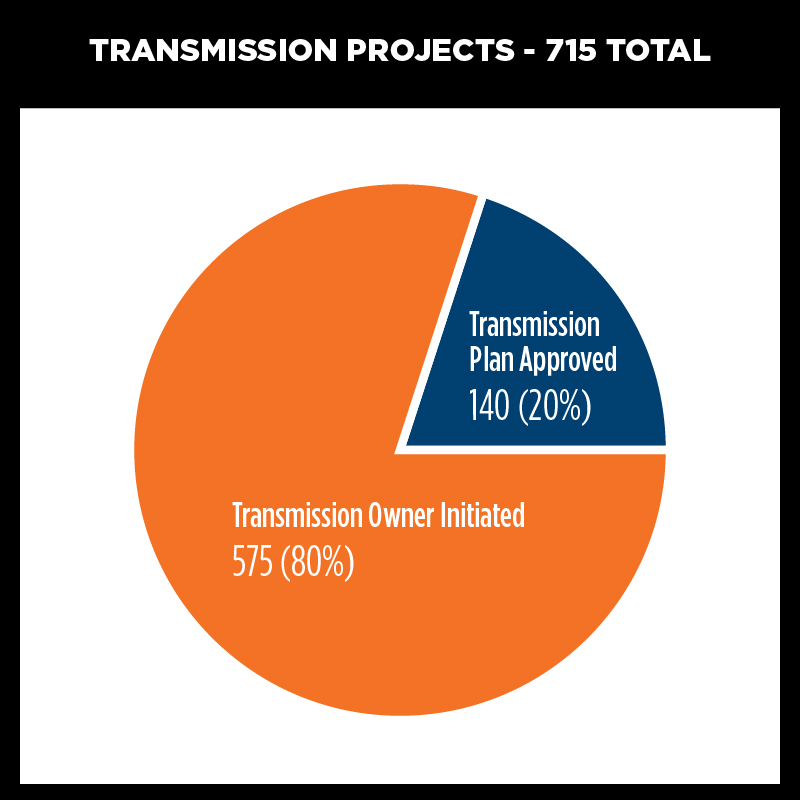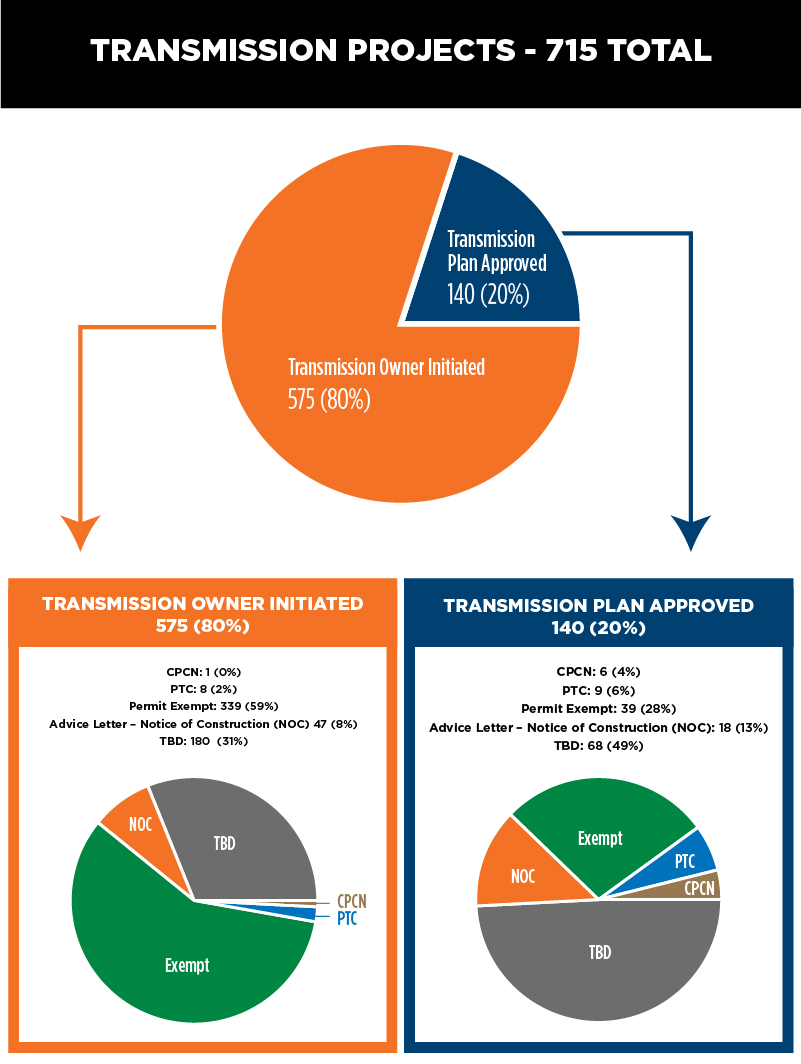Tracking Transmission Projects
To monitor the timely development of transmission projects, the California Public Utilities Commission (CPUC) tracks planned projects through the Transmission Project Review (TPR) process that includes projects approved through the California ISO’s annual Transmission Planning Process and repair and replacement projects initiated by utilities. The TPR process provides detailed, public bi-annual reporting by investor-owned utilities on active transmission projects in development. The reports provide detailed information about the type of transmission project, approval and development status, among other information. The TPR process requires each of the three large investor-owned utilities (Pacific Gas and Electric Company, Southern California Edison Company, and San Diego Gas & Electric Company) convene bi-annual public meetings where stakeholders can ask questions and receive clarification on the reports. The TPR data is used to monitor transmission project progress and costs, among other purposes.
The latest data shows the following break down for total transmission projects:
The Transmission Development Forum is a biannual public forum between California ISO, CPUC and utilities to provide status updates on approved transmission projects that affect clean energy projects seeking interconnection to the transmission system. The next Transmission Development Forum will occur in Q3 2025.
The Tracking Energy Development (TED) Task Force is a joint staff effort of the CPUC, California Energy Commission (CEC), and Governor's Office of Business and Economic Development (GO-Biz) to track new energy projects under development. The TED Task Force coordinates action to understand and address barriers impacting energy development throughout the State. While not focused on transmission, the TED Task Force tracks new energy projects in interconnection queues, which may be impacted by delays to transmission expansion projects.
Transmission Project Approval
The CPUC permits transmission projects in the California ISO balancing authority before construction can begin. The CPUC's General Order 131-E (GO 131-E) outlines rules for the permitting and construction of electrical transmission lines, power lines, distribution lines, substations, and electric generation facilities in California. These projects include those approved by California ISO as part of its annual Transmission Planning Process (TPP), as well as projects proposed by a public utility to upgrade and maintain existing infrastructure, such as projects to ensure the reliability of electrical service provided to its customers. All public utilities are subject to GO 131-E, including independent transmission owners. GO 131-E defines a transmission line as a line designed to operate at or above 200 kilovolts (kV), and a power line as a line designed to operate between 50 and 200 kV. A distribution line is defined as a line designed to operate under 50 kV.
The CPUC issues two different types of permits, a Certificate of Public Convenience and Necessity (CPCN) and a Permit to Construct (PTC). GO 131-E contains detailed criteria for determining which permit is required based upon the individual details of the project. The CPUC reviews project cost for CPCN applications but does not review project cost for PTC applications. Issuance of both CPCNs and PTCs is subject to the California Environmental Quality Act (CEQA) where the environmental impacts of the project are evaluated as part of the permit approval process.
CEQA generally requires state and local government agencies to inform decision makers and the public about the potential environmental impacts of proposed projects, and to reduce those environmental impacts to the extent feasible. The laws and rules governing the CEQA process are contained in the CEQA statute (Public Resources Code Section 21000 and following), the CEQA Guidelines (California Code of Regulations, Title 14, Section 15000 and following), published court decisions interpreting CEQA, and locally adopted CEQA procedures.
GO 131-E outlines various exemptions to the CPCN and PTC permitting requirements. Utilities must provide a notice of the proposed construction (NOC) of any projects that are deemed to be exempt from the PTC requirement through an advice letter process. CPUC General Order 96-B (GO 96-B) - PDF establishes the process for filing an advice letter, which is an informal request by a utility for CPUC approval, authorization, or other relief. The advice letter process is not a formal proceeding, but advice letters are subject to disposition by CPUC staff as well as a 20-day protest period whereby a member of the public may protest the application. Once an advice letter is approved, project construction may proceed.
Projects that are statutorily or categorically exempt from CEQA, distribution lines, and certain projects identified in GO 131-E do not require permitting or notification through the advice letter process and are labeled “Exempt” or “Exempt from Permit.”
Projects for which the permit requirements have not yet been determined are labeled to be determined (TBD) by the transmission owners.
Visit the CPUC’s CEQA page for more information about the CPUC’s environmental review process and the status of specific transmission projects under CPUC review or monitoring during construction. On January 30, 2025, with the adoption of Decision (D.) 25-01-055, the CPUC updated GO 131-D to GO 131-E to implement Senate Bill 529 (Hertzberg, 2022) and to further streamline and clarify the regulatory approval process for electrical transmission infrastructure. Below are the key highlights of the decision:
- Applicant-prepared draft versions of environmental documents may be submitted to the CPUC, as an alternative to a Proponent’s Environmental Assessment (PEA).
- Pre-filing consultation between applicants and CPUC staff is required to help the review process run more smoothly.
- Authorization of a pilot program to explore the potential for a faster CEQA review process.
- Implementation of a “rebuttable presumption” of need for transmission infrastructure projects.
- Clarification of the advice letter protest process for projects exempt from CPCN and PTC requirements, where an NOC is required.
- Simplification of utility reporting requirements to the CPUC for transmission infrastructure projects.
- Clarification of key terms to better explain which types of electrical projects require formal permits, and which projects are exempt.
The CPUC’s information sheet on streamlined transmission permitting - PDF contains more information on the update.
Here's how current transmission projects break down by approval method:
The TPR Data Fact Sheet contains additional data and analysis.
Transmission Project Construction
Following approval by California ISO and CPUC, the transmission project owner must satisfy any conditions of that approval, such as revegetation, wildfire/safety requirements, traffic plans and air quality compliance.
When the project owner receives approval, construction may commence. The project owner must finalize engineering, procure equipment, and secure its workforce for the construction project. While smaller scale projects may be completed within 18 months, larger and more complex projects often take years to complete.


